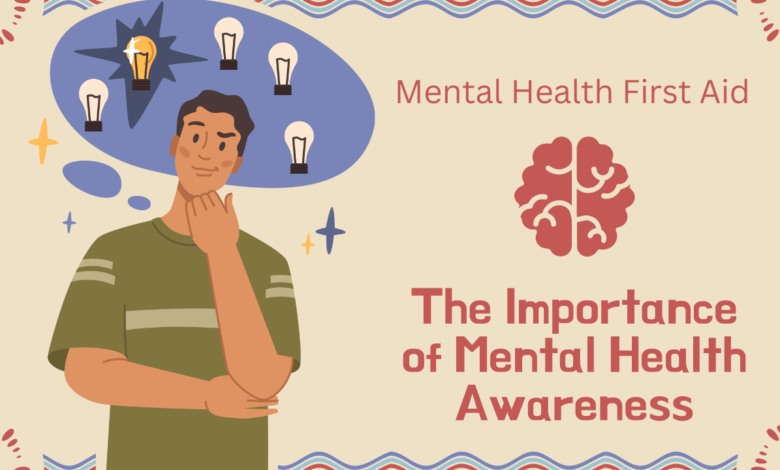Mental Health Matters: The Role of Awareness Days and First Aid in Emotional Wellbeing

In recent years, society has started recognizing the importance of emotional and psychological wellness alongside physical health. The rising conversations around mental health have led to a cultural shift where people are more open to discussing their emotions, seeking help, and reducing the stigma once attached to mental illness.
From workplaces to schools, and communities to governments there’s a growing understanding that mental well-being is not a luxury but a necessity. While treatment and therapy remain crucial aspects of recovery and resilience, awareness initiatives and first-aid preparedness play a key role in prevention and support.
Why Mental Health Awareness Matters
Historically, mental illness was overlooked or misunderstood. Many people suffering from depression, anxiety, or trauma stayed silent due to fear of being judged or misunderstood. Awareness campaigns aim to break that silence by promoting education, compassion, and access to resources.
These initiatives are designed to help individuals understand what mental health is, how to recognize signs of emotional distress, and what steps to take for themselves or others. When people are informed, they are more likely to seek support and less likely to isolate themselves in silence.
Mental health is a part of everyone’s life whether you experience challenges directly or support someone who does. Promoting awareness helps reduce stigma and encourages early intervention, which can lead to better outcomes.
The Importance of Observing a Mental Health Day
Taking a break for your mental well-being is just as important as taking a day off for physical illness. A designated mental health day whether official or self-declared allows individuals to pause, reset, and attend to their emotional needs.
This can involve activities like:
Resting and catching up on sleep
Practicing mindfulness or breathing exercises
Disconnecting from work emails or social media
Spending time in nature
Reflecting through journaling or meditation
Talking to a friend or therapist
The goal of a mental health day is not to avoid responsibilities but to preserve balance. It serves as a reminder that self-care is a proactive strategy, not a sign of weakness. Schools, employers, and organizations that support these practices send a powerful message that emotional wellness is not only valid but vital.
How Awareness Days Inspire Collective Change
Globally recognized days like World Mental Health Day (October 10th) have a larger impact beyond individual reflection. These events open the door for media coverage, public policy discussions, and educational programs focused on mental wellness.
Such days:
Encourage conversations that otherwise might not happen
Normalize therapy and emotional support
Highlight underrepresented groups facing mental health challenges
Showcase resources available at community or national levels
Push companies and governments to improve access to mental care
Even on social media, hashtags and campaigns around awareness days create a sense of shared experience, reminding people they are not alone in their struggles.
The Value of Mental Health First Aid
Just as physical first aid helps stabilize someone before professional help arrives, mental health first aid teaches people how to recognize and respond to emotional crises in others. This may include offering calm support to someone having a panic attack, recognizing signs of depression, or knowing how to ask if someone is thinking about suicide.
Mental health first aid training is offered in many countries and can be completed by anyone with no psychology degree required. These programs equip individuals with practical skills such as:
Identifying early warning signs of emotional distress
Providing non-judgmental support
Knowing when and how to refer someone to professional help
Offering reassurance and reducing panic
Maintaining boundaries while helping others
In workplaces, schools, and public service environments, having staff trained in mental health first aid can literally save lives. It builds confidence in responding to situations that might otherwise be avoided or mishandled due to fear or misunderstanding.
Creating a Culture of Emotional Safety
Mental wellness does not come from one-time events or isolated support — it thrives in environments that encourage open conversations, psychological safety, and shared responsibility. Creating emotionally safe spaces means:
Leaders setting the tone by modeling vulnerability
Normalizing mental health breaks without guilt
Encouraging regular emotional check-ins
Designing policies that prioritize both physical and mental wellness
When people feel supported and understood, they are more likely to share what they’re going through and seek the help they need. This prevents minor issues from becoming major crises and reduces long-term emotional burnout.
Integrating Awareness and Action
It’s not enough to raise awareness, the next step is always action. Whether that means reaching out to someone you’re worried about, suggesting a workplace policy update, or simply taking better care of yourself, every small step matters.
Awareness days help start the conversation, and first-aid training ensures people know what to do when the conversation gets serious. Together, they form a comprehensive approach that values prevention as much as treatment.
Read Also: Apple Watch Health Features vs blēo: A New Era of Wearable Wellness
Final Thoughts
Mental wellness is a lifelong journey, not a one-time fix. As communities become more informed, more compassionate, and more proactive, the path to emotional well-being becomes clearer and more accessible to all.
Taking a mental health day, understanding the basics of mental health first aid, and openly discussing mental health can all contribute to a healthier, more supportive world.
Investing in emotional safety today builds stronger individuals, healthier families, and more resilient communities tomorrow.



